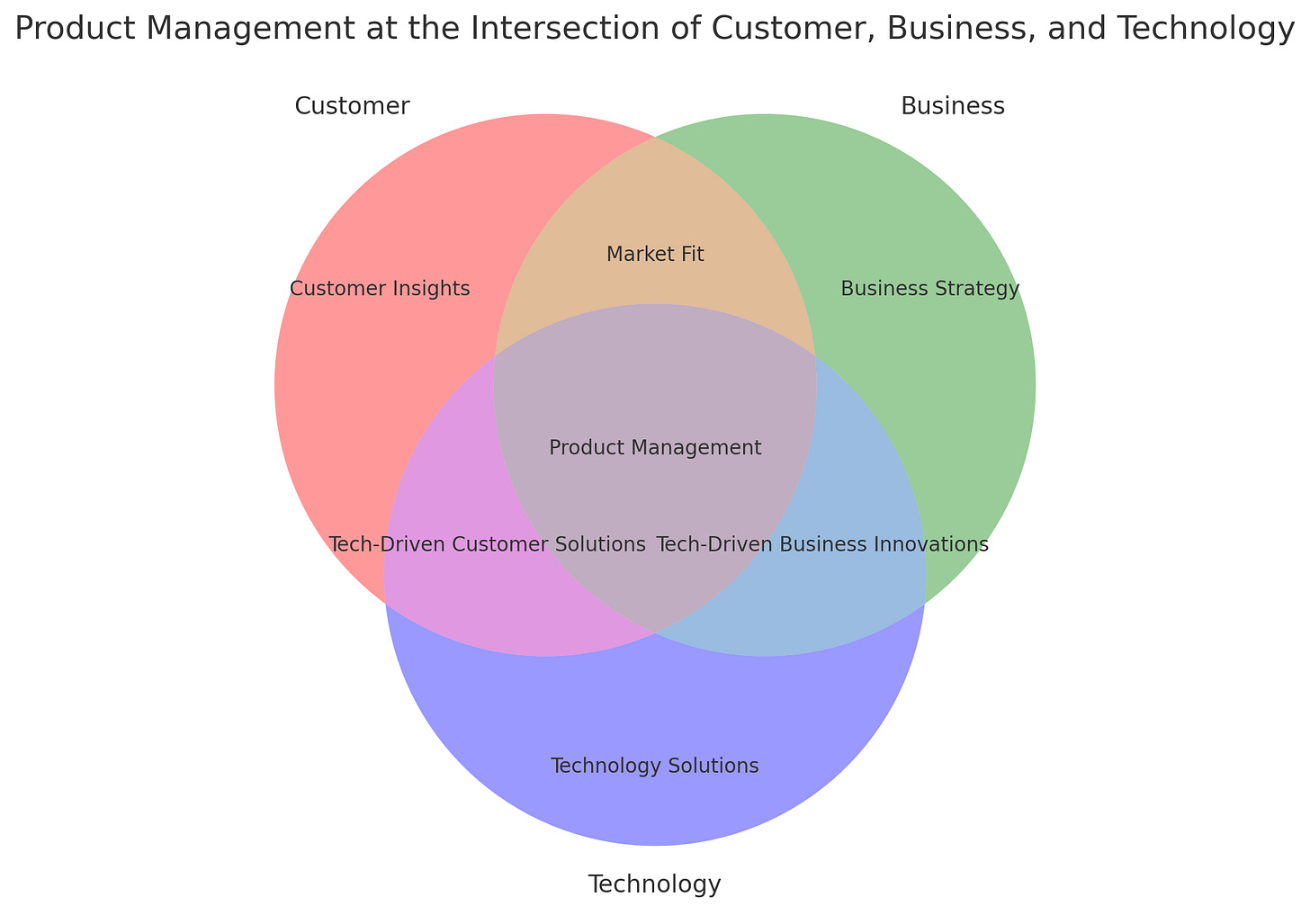Product Mindset - What is Product Management? (P1)
The Art and Science of Transforming Ideas into Market Gold 🎖️
This Product Mindset series is an effort to set foundational product mindset elements right.👌This covers some very basic but practical information crucial for any aspiring or new Product Manager to build and strengthen their Product Mindsets. 🤯
Below is the agenda/posts of this series:👇
What is Product Management (2 Parts)?
Are PLC, PDLC, and SDLC the same thing?
What is the relationship between Business, Portfolio, and Product?
How is the Product different from the Project and Product Manager from a Project Manager?
Who is a Product Manager and what does he/she do?
What is the confusion about the role of Product Manager and Product Owner?
More such topics to strengthen product mindset…
If you want to become and grow as a Product Manager then the first 2 concepts to master are:
Product Management (Topics for this edition🤩 (Part 1 + Part 2))
So far, we have established the foundation for the definition, identification, and classification of products.
Now, we are ready for a deep dive into Product Management. This is a 2 part edition.
Product Management - Part 1 (this post) ☝️
Introduction
Definition
Origin
Importance and Positioning
Key Responsibilities
Skillset
Product Management - Part 2 (next post) ✌️
Challenges
Real-life Examples and Learnings
Future of Product Management
Conclusion
Resources (Books, Blogs, Communities, Events, etc.)
Introduction 👋
In today's fast and agile business landscape, the role of product management has an undisputed value in driving innovation and success. There are numerous ideas and solutions competing with each other for customer attention, market share, and business viability, but only a few manage to achieve it.
Product Management and Product Managers have a great contribution to the success of these products by navigating the complexities of development, market needs, and customer satisfaction to bring groundbreaking solutions to life.
Product management is not about a job title; it's a multifaceted discipline that combines strategic thinking, creativity, and leadership. It plays a pivotal role in transforming visionary ideas into tangible products that meet market demands and exceed customer expectations.
As companies strive to stay ahead in competitive industries, the demand for adept product managers continues to grow, underscoring the importance of capable product managers across the domains and industries.

This article elaborates on the essence of product management, providing a clear definition, exploring its significance, and outlining the key responsibilities and skills required for success in this demanding and high-impact area.
Whether you're an aspiring product manager, a business leader seeking to understand the role, or simply curious about what goes on behind the scenes of product development, this comprehensive guide will offer valuable insights into the world of product management.
Product Management
Product management is the art and science of guiding a product through its entire lifecycle, from initial concept to market launch and beyond. At its core, product management involves understanding market needs, defining a product vision, and working with cross-functional teams to bring that vision to life. But what exactly does this mean?
Definition
Product management is a strategic function within an organization that focuses on creating, developing, and managing products to meet customer needs and achieve business goals.
It encompasses everything from market research and product design to development, launch, and continuous improvement. The product manager acts as the glue that binds various departments together, ensuring that every aspect of the product aligns with the overall strategy and delivers value to customers.
Historical Context

The concept of product management has evolved significantly over the decades. It began in the early 20th century when Procter & Gamble introduced the idea of "brand men" to manage individual product lines. This role expanded as companies recognized the need for dedicated professionals to oversee the entire lifecycle of a product. In the digital age, the role of product managers has become even more crucial, especially in technology-driven industries where innovation and agility are key.
Importance & Positioning
Product management is vital for several reasons. Firstly, it ensures that products are developed with a clear understanding of market needs and customer pain points. By keeping a pulse on the market, product managers can steer the product in the right direction, making necessary adjustments to stay competitive.
Customer Insights: Focuses on understanding customer needs and preferences.
Business Strategy: Involves setting goals and strategies for business success.
Technology Solutions: Pertains to the technological capabilities and innovations.
Market Fit: Where customer insights align with business strategy.
Tech-Driven Customer Solutions: Combines technology solutions with customer needs.
Tech-Driven Business Innovations: Integrates technological advancements with business strategies.
Product Management: At the intersection of all three areas, balancing customer needs, business objectives, and technological possibilities.
I know it’s a lot to take in and you might want to find your path. Hence, I invite you to a FREE 1:1 discovery session with me.
Book a Free session with me🗓️ to unlock your potential.🤝
Product management fosters cross-functional collaboration, bringing together diverse teams such as engineering, marketing, sales, and customer support to work towards a common goal. This collaboration is essential for creating a cohesive and successful product.

Finally, product management drives business success by aligning product strategies with organizational objectives, ensuring that resources are effectively utilized to maximize return on investment.
In summary, product management is a multifaceted discipline that plays a crucial role in the success of modern businesses. It involves understanding market dynamics, defining a clear product vision, and collaborating with various teams to deliver products that meet customer needs and drive business growth. As we delve deeper into the responsibilities and skills of product managers, we'll uncover the essential elements that make this role so indispensable in today's competitive landscape.
Key Responsibilities of a Product Manager
Product Manager is the person who is expected to lead the function of Product Management for any product. A product manager wears many hats, balancing strategic vision with day-to-day operational tasks. The role is both dynamic and demanding, requiring a deep understanding of the market, the product, and the needs of the customer.

The extent of the depth required could vary from industry to industry and product to product. Some product management roles are more domain-focused and others might be more tech-focused. This indicates there are different types of roles within Product Management. We are going to do a deep dive into this in the upcoming edition of this Product Mindset series.
However, in general, a Product Manager is responsible and/or accountable for Market Research, Product Vision and Strategy, Cross-functional Collaboration, Product Development, Product Lifecycle Management, Metrics and KPIs, and more such functions.
Understanding the responsibilities and leveraging the right guidance to hone the skills is crucial for any new and aspiring product manager.
I have traveled this path in the past. So, I want to show the path and guide professionals who are struggling in their professional journey.
Book a FREE session with me🗓️ to unlock your potential.🤝
A skilled Product Manager
To be able to take up these responsibilities (briefly explained above and a detailed version is slotted to an upcoming edition of this Product Mindset Series) the Product Manager needs to be skilled enough. The needed skills span across leadership, technical knowledge, analytical thinking, and customer empathy. Similar to the responsibilities section the needed degree of skill combination could have a different mix, depending on the product, organization, industry, etc.
However, a minimal set of expected skill sets consists of Leadership and Communication, Analytical Thinking, Problem-solving, Customer Empathy, Technical Knowledge, etc. to name a few.
By honing these skills, product managers can effectively guide their products from conception to market success, ensuring they meet customer needs and deliver value to the business.
Mode detailed elaboration on this in the upcoming edition of this Product Mindset series.
Part 2
In the 2nd part of this topic, we will cover more to solidify the current understanding through:
Challenges
Real-life Examples and Learnings
Future of Product Management
Conclusion
Resources (Books, Blogs, Communities, Events, etc.)
👋 Signing off. In the meantime, I invite you to connect with me on LinkedIn.





